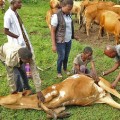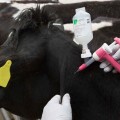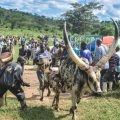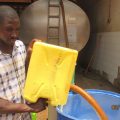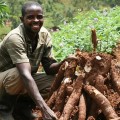FARM NEWS
Farmers suffer double pain of Covid, foot-and-mouth disease
Published
5 years agoon
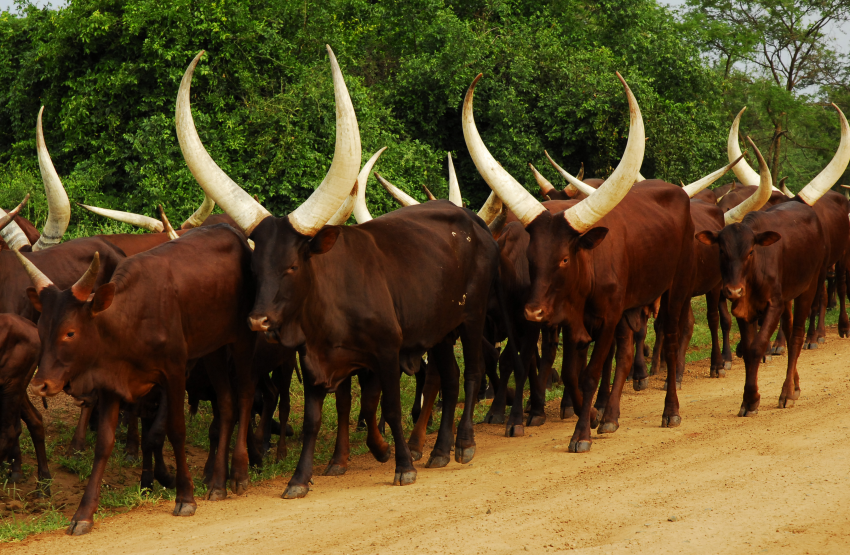
Hundreds of pastoralists around the cattle corridor, whose livelihood is mainly from the sale of animals, are feeling the squeeze as a result of Covid-19 and foot-and-mouth disease (FMD) quarantine that has made it impossible for them to sell animals.
The cattle corridor districts in Uganda sit in Lango, Ankole, Karamoja, Teso, Luweero sub-regions.
In Karamoja, cattle is the source of all livelihood during times of grain shortage. The proceeds from animal sales enable pastoralists secure grains but this has been limited during the lockdown as law enforcers tighten their grip against movement of animals and operation of markets.
Mr Mark Abuko, the Kaabong District chairperson, for told Daily Monitor that pastoralists in his district are struggling with the double tragedy of livestock quarantine and Covid-19 pandemic guidelines as they cannot sell in open markets.
“I belief the most disadvantaged people in this era of Covid-19 have been pastoralists in areas of Karamoja, where livestock quarantine has affected pastoralists. Before we could cope with effects of foot-and-mouth disease, another human disease struck,” he says.
Mr Abuko says the pastoralists have had to rely on relief from the World Food Programme (WFP), adding that these rations are not proportionate to the food needs of families.
“I thank WFP, but during normal days, such food ration would be supplemented with other grains bought using proceeds from animal sale. It is not the case now,” the Kaabong District chairperson says.
Illegal markets
A clan elder in Kotido Sub-county, Mr Joel Lomongin, says some unscrupulous pastoralists have been prompted to set up illegal markets, which has increased tension in Karamoja, adding that stolen animals are always sold in these markets that are unknown to the district authorities.
He adds that this has left the community at crossroads of both veterinary and law enforcement officers.
Mr John Dengel, a pastoralist in Nadunget, Moroto District, says ever since the quarantine caused by the foot and mouth disease was imposed, vaccination exercises have not been done.
Mr Fredrick Eladu, the Kaabong District Veterinary Officer, told Daily Monitor that vaccination was completed a week ago, adding that as veterinary officer, all they are waiting for are officers from the diagnostic department from Entebbe to carry out zero surveillance.
Mr Eladu adds that even though the quarantine gets lifted, the other hurdle standing in the way of pastoralists will be the closed markets.
“For the time we have been in this double quarantine, pastoralists have been selling chicken, charcoal,” he says.
Mr Eladu says a great deal of livelihood among pastoralists has been lost, adding that the outcome in the next few weeks from the diagnostic team at Entebbe will inform when FMD will be lifted by the commissioner-in-charge of animal health.
He adds that FMD is a contagious viral disease, which affects animals which have divided hooves, and severely affects production of livestock.
Mr Robert Kennedy Okuda, the production officer in Kotido, says the ministry delivered limited vaccines to the tune of only 10,000 doses against 5,578,000 head of cattle in Kotido alone.
“It means we only vaccinated 0.5 per cent of animals in the entire Kotido,” he adds.
Mr Okuda says because of delayed vaccination, pastoralists in protest started setting up illegal cattle markets, which law enforcement officers have clamped down, and animals sold in such settings have been confiscated and sold locally upon our advice as technical officers.
In Kazo District, there are seven monthly cattle markets, some operating once a month and others twice, each giving the district Shs8 million every financial year which translates into Shs56 million.
Livestock and general merchandise markets have been closed for five months now, which has rendered the district short of money.
“Local revenue finances 14 per cent of the district budget; this means we have to adjust the budget because there is no compensation. Trading licence collections are very low; shops and other businesses in trading centres have been closed,” Mr Laban Kanyohora, the Kazo interim vice chairperson, said on Monday.
He added: “We hope the central government will find a way of covering this shortfall. It should consider giving us money to compensate for the revenue we have lost.”
The chairperson of Butuku Cattle Marketing Cooperative Society in Ntoroko District, Mr Charles Kasoro, says the situation is very difficult for them because selling cattle is their only income generating activity. He adds that cattle markets are vital for their survival.
“We do not dig, so if we cannot sell our cattle, we cannot get food,” Mr Kasoro says.
“We have been selling our cows to the neighbouring districts of Bundibugyo and Kabarole and in return, they also sell us food; but now we are stuck,” he says.
He adds that although there is food in the market, they have no money to buy it.
Mr Kasoro wants the President to consider opening cattle markets to allow Ntoroko people to resume their earnings.
“We can manage separating food and cattle if the President considers reopening our markets. We are ready to adhere to all measures,” Mr Kasoro says.
Protests
In Sembabule, quarantine has been in force since August 7, 2019.
This forced Lwemiyaga County legislator Theodore Ssekikubo to mobilise farmers to defy quarantine restrictions and this led to his arrest in January.
But a July 7 letter by the commissioner of Animal Health, Ms Anna Rose Ademun, lifted quarantine restrictions which brought excitement among livestock farmers in the affected sub-counties of Mitima and Lugusulu.
“The purpose of this communication is, therefore to inform you that the quarantine restrictions imposed on have been lifted,” Ms Ademun’s letter reads in part.
Although the quarantine was lifted, farmers still cannot sell their animals since cattle markets are closed as one of the measures to curb spread of coronavirus.
Mr Ezekiel Gumisiriza, a cattle farmer in Kabukongote Village, Malongo Sub-county in Sembabule District, says due to coronavirus restrictions middlemen are taking advantage of farmers.
Mr Robert Kanyete, the chairperson of Nyekundiri Farmers Association in Kyalulangira Sub-county, Rakai District, said the lock down has greatly affected farmers since cattle dealers no longer come.
“Cattle dealers come from Kampala, Masaka and other urban areas, but since Rakai District is among border districts and public transport is still restricted, farmers have no one to buy,” he said
In Lyantonde, Mr Fred Muhangi, the district chairperson, said although the quarantine has been lifted in the area, farmers still have to wait for the government to reopen cattle markets.
“People are free to sell their animals from the farms provided they can observe social distancing,” he said.
In Nakasongola, Mr Sam Kigula, the district chairperson, says the unending quarantine status that covers 80 per cent of the district continues to cripple the different development and service delivery sectors that depend on the local revenue resource envelope from the livestock industry.
“Nakasongola was hit hard. We had anticipated that the sub-counties of Nabiswera, Wabinyonyonyi and Nakitoma could have a partial lifting of the cattle quarantine but it has not been possible,” he adds.
The district local revenue resource envelope has dropped to the lowest in the past three years.
“We now post an estimated Shs150m unlike the years before the cattle quarantine when the district registered Shs400m,” Mr Kigula told the Daily Monitor.
Vaccination
Authorities respond. Dr Robert Ojala, the regional veterinary inspector for Teso and Karamoja sub-regions, says the country has done vaccination, saying some of this vaccination was selectively done in areas with pronounced Foot and mouth disease.
He admits that in Kotido, the vaccine delivered was not commiserate to the numbers, and it is the reason that selective vaccination was carried out.
“For the case of Katakwi, Karamoja, a team of doctors from the diagnostic department from Entebbe are expected to carry out tests this week for zero surveillance, and when the tests come out negative, the commissioner in charge animal health will lift the quarantine,” Mr Ojala says.
He adds that although this lifting is anticipated, he is not sure how cattle keepers will sell their animals because the Covid-19 strain lives on.
Mr Ojala says he understands the anxiety among pastoralists and businessmen dealing in cattle, but they will have to wait a little longer to sell their products.
Compiled by Simon Peter Emwamu, Steven Ariong, Alfred Tumushabe, Scovia Atuhaire, Al-Malahdi Ssenkabirwa, Wilson Kutamba, Paul Ssekandi, Dan Wandera.
You may like
-
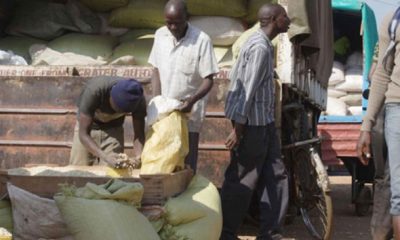

African farmers and agribusinesses need fair access to markets
-
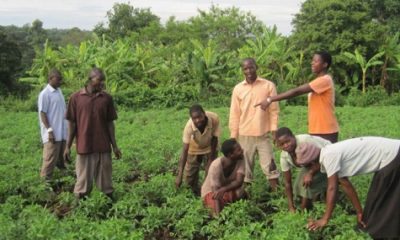

Access to land, capital hampering youth’s involvement in agri-business
-
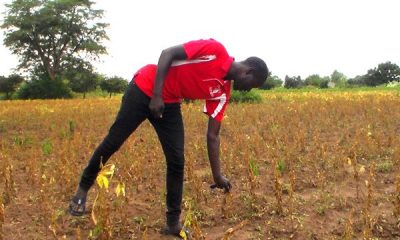

Farmers count losses as drought hits north
-
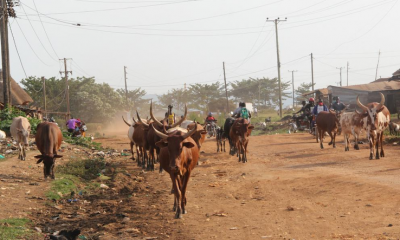

Foot and mouth disease outbreak confirmed in Jinja
-
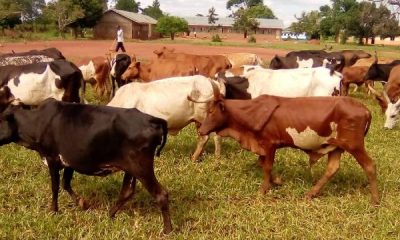

Anaplasmosis disease killing cattle in Bududa
-
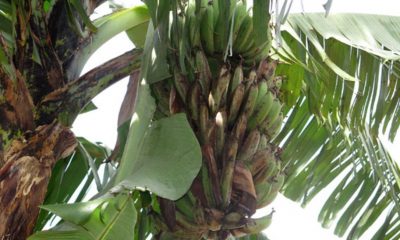

Kabale banana farmers battle bacterial wilt again

A smallholder tomato farmer in the northwestern Uganda region of West Nile sprays his half-acre tomato garden without adequate protection. Many farmers around the country interact with hazardous agro-chemicals without using adequate PPEs. COURTESY PHOTO/SASAKAWA AFRICA ASSOCIATION.
A consortium of civil society organisations (CSOs) has in a Jan.05 statement shown concern about the continued wrong use of dangerous pesticides in the country.
Members of the concerned CSOs mainly work to promote sustainable agricultural trade, food safety and sovereignty, climate justice, biodiversity restoration, and human and environmental rights.
The activists say there are growing concerns about pesticide misuse, including improper application and storage, counterfeit products, insufficient training in use, and use of poorly maintained or totally inadequate spraying equipment.
The activists insist the agriculture ministry should deregister at least 55 agro-chemicals that it registered in 2023 well-knowing that the same pesticides, herbicides and insecticides are banned by the European Union, a major market of Uganda’s agricultural produce.
Glyphosate-based herbicides, in particular, have raised significant alarm due to their potential environmental and health risks. Globally, they have been linked to contamination of water sources, soil degradation, and potential carcinogenic effects on humans.
In Uganda, glyphosate which appears in brands such as Rounduo and Weed Master, is widely used, especially among large-scale commercial farms and in weed control.
Betty Rose Aguti, the Policy and Advocacy Specialist at Caritas-Uganda who also doubles as the National Coordinator of Uganda Farmers Common Voice Platform says Uganda’s smallholder farmers need to be guided on the danger posed by some agro-chemicals.
“No one is guiding them on what to do with the agro-chemicals. Nobody is telling the farmers which agro-chemicals to use in what type of soils or on which type of crops and thereafter, what period of time they should take before they harvest.
“We have scenarios where some of these farmers apply these agro-chemicals bare-chested with no face masks and other protective gear; these farmers are using agro-chemicals as though they are using ordinary water.”
“They spray their gardens as they converse with their children and wives. In the course of doing this, they are inhaling the chemicals and after some time, they fall victim to the toxicity of these agro-chemicals and end up flooding the Uganda Cancer Institute,” she says.
What are pesticides?
Pesticides are defined by UN agencies; the Food and Agriculture Organization (FAO) and the World Health Organization (WHO), as substances or mixture of substances of chemicals or biological ingredients intended for repelling, destroying or controlling any pest, or regulating plant growth.
These often include ingredients that modify pest behaviour or their physiology (insect repellents) or affect crops during production or storage (herbicide safeners and synergists, germination inhibitors), as well as insecticides, fungicides and herbicides.
However, according to the activists, most of the chemicals on the Ugandan market are quite hazardous to both human health and the environment and yet they continue being used inappropriately by Ugandan smallholder farmers.

“We call upon the government of Uganda to regulate and ban all hazardous pesticides especially glyphosate and chlorpyriphos on the market in Uganda,” said Jane Nalunga, the Executive Director of the Uganda chapter of the Southern and Eastern Africa Trade Information and Negotiations Institute (SEATINI), a regional NGO that promotes pro-development trade, fiscal and investment-related poicies and processes.
Backbone of Uganda’s economy
The activists say Uganda’s agriculture sector is the mainstay of Uganda’s economy as it remains the main source of food, raw materials for industries, and employment of about 70% of Ugandans. The sector contributes about 24% to the country’s GDP.
“We cannot allow people with intellectual dishonesty to continue playing with the sector,” one of the activists said on Jan.5 during a press conference at the SEATINI-Uganda headquarters in Kampala. “We are aware that pesticides are significantly impacting health, biodiversity, socio-economic well-being, trade, and food security,” added Nalunga.
According to a 2020 World Health Organisation report, about 385 million cases of unintentional pesticide poisoning, including 11,000 deaths, mostly in low- and middle-income countries such as Uganda, are registered annually worldwide. According to UNICEF, pregnant and breastfeeding mothers, children under the age of five and the elderly are the most vulnerable to the effects of pesticides.
The activists say increased use of highly hazardous pesticides in Uganda is a threat to the right to adequate food, people’s livelihoods and farmers’ rights. They say pesticide runoff is reducing aquatic species diversity by 42% and threatening pollinators like bees. These insects are particularly critical for 75% of global crop production.
According to the European Environmental Agency, pesticides are intrinsically harmful to living organisms. When used outdoors, they can impact ecosystems even when they are intended to exclusively target a specific pest.
Herbert Kafeero, the Programme Manager at SEATINI-Uganda says the use of hazardous pesticides also has implications for trade. He says, in 2015, the government of Uganda imposed a self-ban on the export of agricultural produce to the EU because agro-chemical residues had been found in Uganda’s agricultural produce. “The self-ban was meant to address the challenges that were cited by the EU,” he says, “So we cannot ignore the fact that hazardous pesticides negatively impact the country’s trade and food security.”
He says, at the time, the government committed to retrain farmers and exporters to the EU regarding the EU’s sanitary and phytosanitary standards. Kafeero says the government must find solutions to the mushrooming agro-chemical dealers on the market.
“In every trading centre, you will not miss finding an agro-chemical shop and the person operating that agro-chemical shop presents himself as an expert when they actually are not.”
The activists want the Agricultural Chemicals Control Board under the Ministry of Agriculture, Animal Industry and Fisheries to quickly profile the various agrochemicals, acaricides and inputs and their various sources that are available on the market in Uganda and ban the highly hazardous ones.
They also want the Department of Crop Inspection and Certification at the agriculture ministry to strengthen the regulation, management, use, handling, storage and trade of agrochemicals in the country.
They also want the government and other stakeholders to purposively plan and budget for education and awareness on the management, use, handling, storage and trade of agrochemicals in Uganda.
Prof. Ogenga Latigo disagrees
The activists were infact responding to Morris Ogenga Latigo, a Ugandan professor of entomology (study of insects) who had written an opinion on December 31, 2024, downplaying civil society’s concerns about hazardous pesticide and insecticide use in Uganda.
Prof. Ogenga Latigo in his article said the issue of agro-chemical use on farm pests and weeds and households was being exaggerated by civil society. He said the targeted agro-chemical inputs (pesticides, insecticides and herbicides) were being used in other countries.
The acrimonious debate has since sucked in the agricuture ministry. Stephen Byantware, the Director in charge of Crop Protection at the agriculture ministry told the media in Kampala recently that Uganda has an Agriculture Police Force and a Department of Inspection and Certification of agriculture inputs that “ensure that only nationally and globally approved agro-chemicals enter the Ugandan market.”
“The chemicals allowed into the country are those that have been approved,” he said, “There are no banned products on sale in Uganda. You cannot find DDT or Endosulfan in Uganda.”

But David Kabanda, the Executive Director of the Centre for Food and Adequate Living Rights, a Kampala-based non-profit, says Ugandans should know that hazardous pesticides have become one of the “loudest killers” and yet Ugandan smallholder farmers continue to associate with these chemicals on the farms, in the food stores, and in the homes.
“It’s only in Uganda where we don’t have a farmgate policy and yet we have scientific reports that have pointed out that the food we buy in markets in Kampala is contaminated.” “Don’t we see tomatoes and broccoli full of Mancozeb fungicide yet this chemical has been banned everywhere including the EU?”
“Pesticides are silent killers of humans, of nature, of our soils that are getting barren, of our water, of our agri-food system. I don’t imagine an agri-food system in Uganda without bees, without butterflies, and above all, without grasshoppers,” said Agnes Kirabo, the Executive Director of Food Rights Alliance (FRA).
Desperate smallholder farmers
According to the activists, Uganda’s agriculture system is by default largely organic but in recent years, pest and disease management has become one of the major production constraints for the country’s millions of subsistence farmers. And in recent years, farmers have turned to pesticides to control the pests.
According to the Food and Agricultural Organisation (FAO) of the United Nations, the number of agricultural pesticides used in Uganda doubled in 12 years (2010 – 2022) from 2,990.23 tonnes to 6,009.78 tonnes.

Similarly, the monetary value of pesticides imported to Uganda more than doubled from US$ 32.57 million to US$75.87 million in 2022 with a peak import value of US$108.57 million reported in 2020. The lucrative agro-chemical business has attracted more than 40 registered pesticide importing companies in the country.
The activists say the increased use of pesticides is attributed to their use for weeding and the increased use of hybrid seeds and livestock. According to the CSOs, equally alarming is that many of these pesticides are “synthetic pesticides” which are persistent organic chemicals.
A study published last year by the Food Safety Coalition Uganda (FoSCU) titled: ‘‘Food Safety-Crop Protection Nexus: Insights from the Uganda’s agriculture sector,’’ noted that of the legally registered active ingredients, 47.8% (of the active ingredients) and 68.6% of the brands in Uganda qualified as “Highly Hazardous Pesticides.”
Highly Hazardous Pesticides (HHPs) are classified as “reproductive toxicants” meaning they potentially can negatively affect the human reproductive system and have adverse effects on pregnancy outcomes and reduced fertility.
The same study noted that 15.6% of the registered active ingredients and 19.2% of the registered brands in Uganda qualified as highly hazardous pesticides in accordance with the FAO/WHO-Joint Meeting on Pesticide Management (JMPM) criteria.
According to the activists, by July 2023, over 65% of the 55 flagged active ingredients registered for use in Uganda and yet considered as highly hazardous pesticides according to the Pesticide Action Network (PAN) criteria, were not approved for use in the European Union economic bloc.
The majority (49%) of these pesticides are highly toxic to bees, 20% are carcinogenic and reproductive toxicants while 18% are probable carcinogens, and 9% are highly persistent in water and soil and are highly toxic to aquatic organisms.
They say that, based on the Uganda agrochemical register at the Ministry of Agriculture, Animal Industry and Fisheries (MAAIF) and the National Drug Authority (NDA), the country had at least 115 active ingredients and 669 brands of synthetic pesticides legally registered for use in Uganda by the end of 2023.
“These are presenting in 459 brands, but all these active ingredients in the 459 brands, according to the PAN, are classified as highly hazardous,” said Bernard Bwambale, the head of programmes at the Global Consumer Centre, or CONSENT, who also coordinates the activities on food safety at the Food Safety Coalition of Uganda.

If it is hazardous in EU, it is hazardous in Uganda
Bwambale says his organisation has found that of the 55 active ingredients registered in Uganda, 65.5% of them cannot be used in their countries of origin. “Now, if a chemical, a highly hazardous chemical, is produced in a particular country and that country cannot use it, who are we to start thinking that we can use it? This is where our concern is.”
“So, whatever is not used in the EU, it means it’s not fit for use for human beings. The human beings in Uganda and the human beings in Europe are all human beings. And we are all sharing the same human rights.” He says some of the highly hazardous pesticides are mutagenic, meaning they can alter one’s DNA or genetic make-up.
“Literally, it would mean that when you consume food consisting of this kind of product, you stand a risk of your DNA or your genetic makeup being altered. And that is why some research is pointing to some of these chemicals being responsible for birth defects.” He says other chemicals are carcinogenic, meaning the chemical has the potential to cause cancer.
But Prof. Ogenga Latigo says some chemicals like Mancozeb the civil society claim are carcinogenic are not. He describes others as ‘probable carcinogens.’ A probable carcinogen is a substance that has a strong but not conclusive amount of evidence that it can cause cancer in humans.
But Bwambale says, “They don’t want people to keep confusing us with science.” He says other chemicals have been considered fatal when inhaled. “Imagine a farmer who doesn’t know these things and is spraying but is carrying a baby. So both the mother and the baby are inhaling this chemical,” he says, “We need to regulate these chemicals as much as we can.”
He says recent studies have indicated that some of these chemicals were found in human bodies –in sweat, urine and blood, in food and in water. “When the Europeans send us, for instance, these chemicals and we buy them, they also have regulations on which kind of food we can sell to them. We all know that.”
He says when farmers use these chemicals in the name of commercialising agriculture, they may produce very big tomatoes that do not rot, for example, but they cannot sell them beyond Uganda.
“You cannot put them on the EU market because they don’t meet the standard of the EU market. So they (agriculture products still remain with us,” he says.
Source: The independent
FARM NEWS
Coffee Leaf Rust disease hits Mbale region farmers
Published
8 months agoon
November 18, 2024
Mbale, Uganda | Coffee farmers from Bulambuli and Sironko districts are counting their losses after being attacked by coffee leaf rust disease. The disease, caused by the rust fungus Hemileia vastatrix, can reduce coffee production by between 30% to 50%.
The most affected sub-counties in Sironko include Buhugu, Masaba, Busulani, Bumasifwa, Bumalimba, and others. In Bulambuli, the hardest-hit areas are Lusha, Bulugeni Town Council, Buginyanya, and Kamu, among others.
In an exclusive interview with our reporter, Francis Nabugodi, the Sironko District Agricultural Officer, spoke about the devastating effects on farmers. “This disease has negatively impacted farmers in terms of production, and since it’s coffee season, they are going to make losses,” Nabugodi said.
He added that he had instructed extension workers to start massive sensitization campaigns in the six affected sub-counties about preventive measures, such as spraying, to curb the spread of the disease.
Nabugodi also urged the Ministry of Agriculture, Fisheries, and Animal Husbandry to supply the district with chemicals so they can distribute them to farmers, as many cannot afford to buy them.
Julius Sagaiti, the LCIII Chairperson of Lusha Sub-County in Bulambuli District, stated that his sub-county is the worst affected, with over 100 farmers having all their gardens hit by the disease. He called for urgent action from Bulambuli district leaders, warning that the situation would have severe consequences for farmers.
Timothy Wegoye and Suzan Nanduga, both affected coffee farmers from Bukisa, the worst-affected sub-county, shared their concerns. “The majority of farmers are ignorant about preventive measures and do not know the chemicals for spraying,” they said, urging extension workers to use the media to sensitize them.
Original Source: URN Via The Independent

Along Bwera-Mpondwe road, in Kasese district, farmers till the land, with every hoe raising more dust than dirt, a testament of how hard the sun has scorched the ground. Located at the slopes of the Rwenzori Mountains, the low altitude leads to high temperatures as the district also sits on the Equator. In January this year, the average temperatures were 25.1 °C

Gideon Bwambale walks through drying maize garden.
Today, the temperature is 28.6 °C. The most affected areas are low-lying sub-counties like Kahokya, Nyakatonzi and Muhokya.

Land Grabbing Crisis Escalates in Uganda: Mayiga Urges Citizens to Secure Land Documents

Seizing the Jubilee moment: Cancel the debt to unlock Africa’s clean energy future

Activism on Trial: Despite the increasing repressive measures, Uganda’s EACOP protesters are achieving unexpected victories in the country’s justice systems.

Communities Under Siege: New Report Reveals World Bank Failures in Safeguard Compliance and Human Rights Oversight in Tanzania

A decade of displacement: How Uganda’s Oil refinery victims are dying before realizing justice as EACOP secures financial backing to further significant environmental harm.

Govt launches Central Account for Busuulu to protect tenants from evictions

Activism on Trial: Despite the increasing repressive measures, Uganda’s EACOP protesters are achieving unexpected victories in the country’s justice systems.

Top 10 agribusiness giants: corporate concentration in food & farming in 2025

Innovative Finance from Canada projects positive impact on local communities.
Over 5000 Indigenous Communities evicted in Kiryandongo District
Petition To Land Inquiry Commission Over Human Rights In Kiryandongo District
Invisible victims of Uganda Land Grabs
Resource Center
- LAND GRABS AT GUNPOINT REPORT IN KIRYANDONGO DISTRICT
- RESEARCH BRIEF -TOURISM POTENTIAL OF GREATER MASAKA -MARCH 2025
- The Mouila Declaration of the Informal Alliance against the Expansion of Industrial Monocultures
- FORCED LAND EVICTIONS IN UGANDA TRENDS RIGHTS OF DEFENDERS IMPACT AND CALL FOR ACTION
- 12 KEY DEMANDS FROM CSOS TO WORLD LEADERS AT THE OPENING OF COP16 IN SAUDI ARABIA
- PRESENDIANTIAL DIRECTIVE BANNING ALL LAND EVICTIONS IN UGANDA
- FROM LAND GRABBERS TO CARBON COWBOYS A NEW SCRAMBLE FOR COMMUNITY LANDS TAKES OFF
- African Faith Leaders Demand Reparations From The Gates Foundation.
Legal Framework
READ BY CATEGORY
Newsletter
Trending
-

 SPECIAL REPORTS AND PROJECTS5 days ago
SPECIAL REPORTS AND PROJECTS5 days agoActivism on Trial: Despite the increasing repressive measures, Uganda’s EACOP protesters are achieving unexpected victories in the country’s justice systems.
-

 NGO WORK2 weeks ago
NGO WORK2 weeks agoCommunities Under Siege: New Report Reveals World Bank Failures in Safeguard Compliance and Human Rights Oversight in Tanzania
-

 SPECIAL REPORTS AND PROJECTS1 day ago
SPECIAL REPORTS AND PROJECTS1 day agoSeizing the Jubilee moment: Cancel the debt to unlock Africa’s clean energy future
-

 MEDIA FOR CHANGE NETWORK1 day ago
MEDIA FOR CHANGE NETWORK1 day agoLand Grabbing Crisis Escalates in Uganda: Mayiga Urges Citizens to Secure Land Documents

